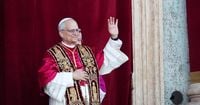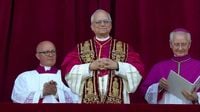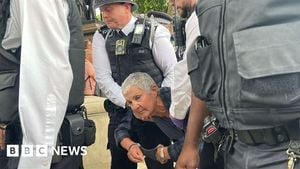On Thursday, May 8, 2025, the Roman Catholic Church made history with the election of Cardinal Robert Francis Prevost as the 267th pope, now known as Pope Leo XIV. The announcement came shortly after white smoke billowed from the Sistine Chapel, signaling that the 133 eligible cardinals had reached a two-thirds majority vote. The moment was met with jubilation in St. Peter's Square, where crowds waved flags from various countries and chanted "Viva il Papa!" (Long live the pope).
Pope Leo XIV, 69, becomes the first-ever pope from the United States, leading over a billion Catholics worldwide, including 53 million American Catholics. His election follows the death of Pope Francis just weeks prior, and his ascension marks a significant moment for the Catholic Church, which is at a crossroads regarding its future direction.
Emerging onto the balcony of St. Peter's Basilica, Prevost wore the white papal cassock for the first time, visibly emotional as he addressed the crowd. "Peace be with you all," he said in Italian and Spanish, before sharing his vision for the papacy, emphasizing themes of peace, unity, and compassion. His choice of the name Leo XIV aligns him with a lineage of popes noted for strong leadership during challenging times, including Pope Leo XIII, who championed the rights of the poor and working class in the late 1800s.
Born and raised in Chicago, Prevost was ordained a priest after studying in Rome and has spent significant time in Peru, where he served as a missionary and later as the archbishop of Chiclayo. His bilingual fluency in Spanish and Italian and his deep understanding of both North and South American cultures position him uniquely to lead the global Catholic community.
Prevost's election has garnered a mix of reactions. While many celebrate his American roots, others express concerns about his past, particularly regarding accusations of mishandling sex abuse cases in his dioceses. However, his supporters argue that these allegations were managed according to the Church's policies at the time.
The new pope's views on various issues remain somewhat ambiguous. For instance, while he has been seen as less progressive than Pope Francis on LGBTQ+ matters, having opposed gender education in schools during his time in Peru, he has not fully rejected the idea of blessing same-sex unions within the Church. His stance on immigration appears to align more closely with Francis, particularly given his experiences in Peru.
As the papacy begins under Leo XIV, the Catholic Church faces significant challenges, including the ongoing tensions between the Vatican and the Trump administration over immigration policies. Just before his death, Pope Francis criticized the administration's approach, and Leo XIV has echoed these sentiments, previously stating that "Jesus doesn’t ask us to rank our love for others" in response to controversial policies.
The election of Pope Leo XIV has sparked widespread enthusiasm, especially in Chicago, where local officials and residents have expressed pride in having their own cardinal ascend to the papacy. Former President Barack Obama congratulated him, stating, "This is a historic day for the United States, and we will pray for him as he begins the sacred work of leading the Catholic Church." Chicago Mayor Brandon Johnson declared, "Everything dope, including the Pope, comes from Chicago!" reflecting the excitement felt in his hometown.
Educational institutions, such as Our Lady of Mount Carmel Academy in Chicago, celebrated the event with mock conclaves, allowing students to engage with the election process in a fun and educational manner. The reactions from the students were filled with joy, as they waved flags and shouted "Habemus Papam!" (We have a pope!), drawing parallels to the excitement surrounding major sports victories in the city.
Prevost's academic background is impressive; he earned a Bachelor of Science in Mathematics from Villanova University and later studied theology at the Catholic Theological Union in Chicago. His extensive experience in the Church includes serving as the president of the Pontifical Commission for Latin America and leading the Dicastery for Bishops, which plays a critical role in vetting candidates for bishop appointments.
As a member of the Augustinian religious order, Prevost has demonstrated a commitment to addressing the needs of marginalized communities. His papacy is expected to build upon the reforms initiated by Pope Francis, particularly in the areas of social justice and environmental stewardship. Leo XIV has previously advocated for action on climate change, supporting initiatives such as the Vatican's shift to solar energy.
Globally, leaders have expressed their hopes for Leo XIV's papacy. Ukrainian President Volodymyr Zelenskyy highlighted the importance of the Holy See's support for international law and peace, while leaders from Kosovo and Kenya emphasized the need for compassion and unity during challenging times.
As Pope Leo XIV begins his tenure, the Catholic Church stands at a pivotal moment, with many looking to him for guidance on how to navigate the complexities of modern society while remaining true to its core values. The world will be watching closely as he leads the Church into a new era, balancing tradition with the pressing demands of contemporary issues.





